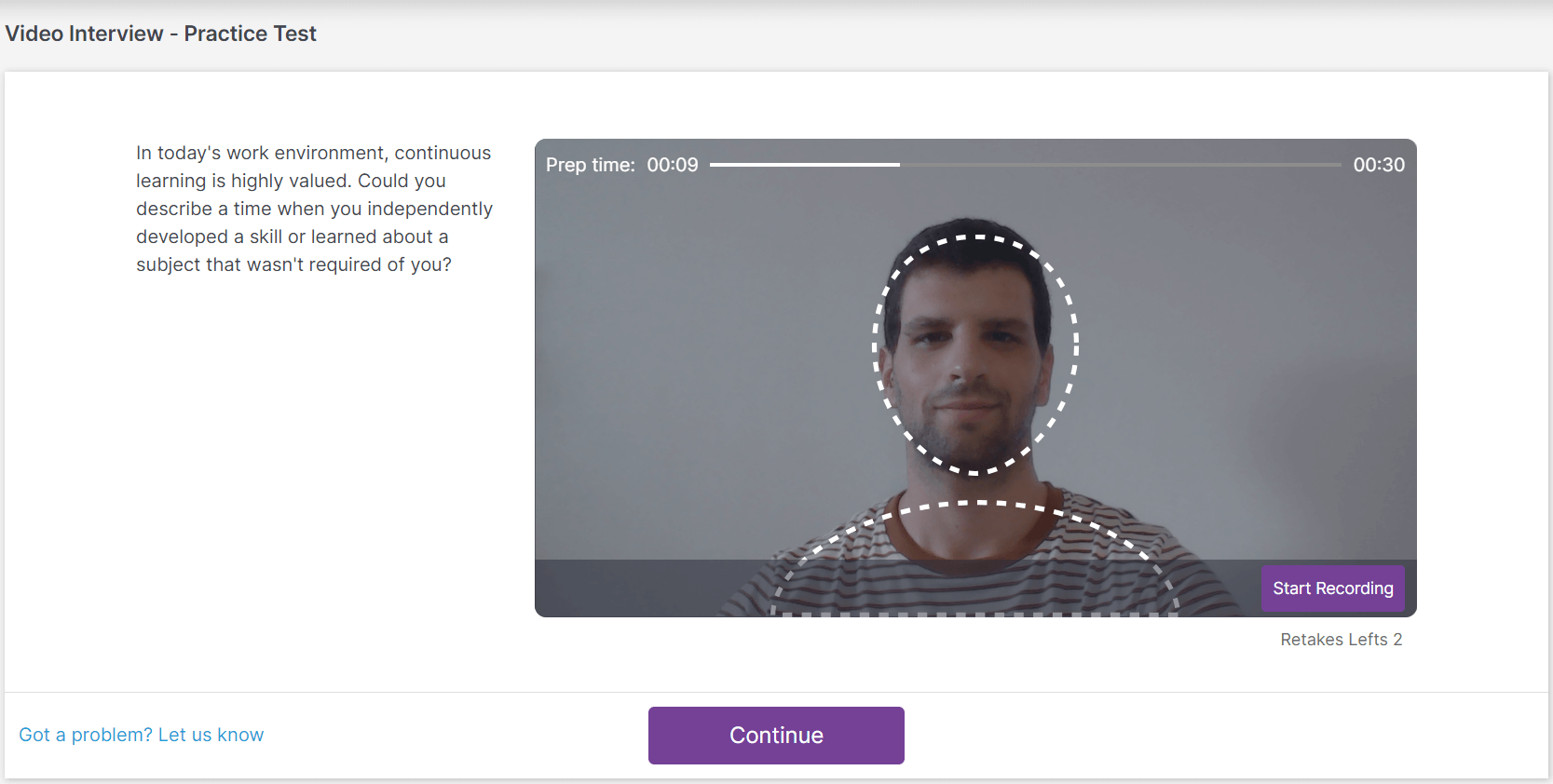 How to Excel a Pre-Recorded Video Interview | Tips & Examples
How to Excel a Pre-Recorded Video Interview | Tips & Examples
A Pre-recorded video interview, also called a one-way video interview, is a common tool for assessing and screening large numbers of candidates with minimal resources.
On this page, you will find a thorough guide to pre-recorded video interviewing, including tips and critical factors we recommend you consider. However, as in every assessment and interview, your best preparation will be practicing your responses.
What Is a Pre-recorded Video Interview?
Pre-recorded video interviewing allows candidates to respond to questions on their own time without the presence of an interviewer. It assists hiring managers by reducing the resources required to execute high volumes of face-to-face interviews. One-sided interviews have become a common practice in the recruitment processes of some of the most renowned organizations, such as Deutsche Bank, Boeing, and Point72, helping recruiters evaluate candidates' personalities, drives, and motivations.

New AI Interview Prep with AI Feedback
JobTestPrep’s AI Interview Prep simulates real AI-based interviews used by top employers, allowing you to practice under realistic conditions. Our tool provides personalized AI feedback on your tone, speech, and content, helping you refine your responses, improve your confidence, and increase your chances of success in AI-driven interviews.
How Do Pre-recorded Video Interviews Work?
During the pre-recorded job interview, you do not interact directly with an interviewer. Instead, you will be alone in front of the camera, responding to pre-recorded questions and assignments.
The number of questions in pre-recorded video interviews can vary depending on the specific role and organization. Typically, these interviews consist of 5 to 8 questions and generally take approximately 20 to 30 minutes to complete. You'll have a designated time frame of 30 seconds to 2 minutes for preparation before responding to each question and up to 3 minutes to record your answer.
The interview can take place through an online platform such as HireVue or Amberjack, or you might be required to capture a video using your phone or computer and share it with your recruiters.
You can record your interview at a location and time that suits your convenience within the specified timeframe for completion.
If needed, you can also re-record your answers, usually up to two times. However, this is only possible before submitting your responses.
After you submit your interview, your recruiters will review it and determine whether you will proceed to the next stage of the hiring process.
Are Pre-Recorded Video Interviews Difficult?
Pre-recorded video interviews can either be a blessing, helping you establish a first impression in your own safe environment and comfortable timing, or highly intimidating. But why?
Well, these interviews are not an easy task. While planning and recording your responses, you need to consider multiple factors, such as:
- The content of your answer: You need to be sharp and quickly formulate relevant responses that show professionalism, interest, and motivation that will meet the organization's values and expectations.
- Communication skills: Interviews demand verbal and emotional fluidity that allows for exchanging ideas in an understandable manner. While you will not face the recruiter, you must consider his reaction every step of the way. Poor communication skills will not only damage the quality of your answers but may also hurt the human connection you attempt to create through your responses.
- The tone of Voice: What you say is not as important as how you say it. You may have high-quality responses and ideas in mind, but if your voice displays hesitance or low motivation or if you just talk too fast, it will impair your delivery.
- Body language: Similar to your tone. Correct posture, eye contact with the camera, and using hand and head gestures will take you far. Recruiters are less likely to pass through candidates who keep a negative or indifferent expression and slouch in their chairs.
- Overall presentation: As this is likely the first visual impression the recruiters will have of you, you must look professional and engaged in the interview, mixing within your body language and tone.
JobTestPrep Video Interview Preparation
Enhance your confidence and performance in pre-recorded interviews with our exclusive preparation:
- Video Interview Practice: Before your actual interview, Familiarize yourself with the complete interview process and gain comfort with a recording platform.
- Recording Practice: Simulate responses to critical interview questions, review your performance, and make necessary adjustments to improve your delivery.
- Analysis and Feedback by Occupational Psychologists: Receive detailed feedback from professional psychologists on various aspects of your performance.
Pre-Recorded Video Interview Examples
The questions you'll encounter are customized specifically for the role you're applying for, which means they will differ from one organization and position to another. For instance, if you're seeking a managerial role, the questions will revolve around your leadership skills and experience in managing teams. On the other hand, if you're applying for a customer service position, the questions will emphasize qualities such as persuasion, empathy, and interpersonal abilities.
The pre-recorded video interview will feature a range of questions designed to gain a deeper understanding of you, both on a personal and professional level. These questions fall into several categories that you should be prepared for:
1. Professional Experience Questions: You will be expected to discuss your previous professional roles, the challenges you've encountered in your career, notable successes, your relationships with coworkers, your comprehension of the position you're applying for, and an honest assessment of your strengths and weaknesses.
2. Situational Judgment Questions: You'll be presented with work-related scenarios and asked to articulate your response and the actions you would take in each situation.
3. Scenario Simulations: You'll be given work-related scenarios and tasked with simulating and demonstrating your response within the given context.
Below, you'll find 7 frequently asked pre-recorded interview questions.
1. Tell something about yourself.
2. Share your interest in this position.
3. Detail your relevant experience and qualifications for this role.
4. Describe your approach to handling pressure.
5. Discuss your most significant professional accomplishment.
6. Explain your conflict resolution approach with colleagues.
7. Describe your career goals for the next five years.
💡 See more popular Pre-recorded video interview questions
Pre-recorded Video Interview Tips
Video interviews, though they may initially feel awkward and unfamiliar, now play a crucial role in the contemporary job market, providing you with the chance to establish a favorable initial impression. Embracing the novelty of this situation and concentrating on optimizing your interview performance will give you a distinct advantage over your competitors. To help you begin, here are some valuable tips:
- Prepare Like You Would for Any Interview
Similar to any typical job interview, it's crucial to conduct thorough research and understand the challenges ahead. Review the job description, familiarize yourself with the company and its values, and gain insight into the expectations for the role and skills that should be highlighted. - Dress Up
While you won't have direct interaction with a person during the interview, your recruiters will be watching closely and paying attention to every aspect, not just your responses. Therefore, it's important to dress appropriately and maintain a clean appearance, just as you would for an in-person one-on-one interview. - Organize Your Environment
Select a peaceful setting with ample lighting and minimal disturbances. Regardless of how adorable Mr. Cuddlepuff may be, it's best to ensure they stay out of the camera's view. - Equip Yourself
Make certain that all your equipment is in optimal condition: ensure a strong internet connection, set up your camera and microphone, and ensure your battery is fully charged, among other things. - Mind Your Body Language and Tone
Sit up straight, maintain direct eye contact with the camera, keep a moderately enthusiastic facial expression, articulate your words clearly and logically, and maintain a warm and professional tone. - Practice Recording Responses
Prior to your interview, simulate responses to key questions while considering your content, verbal fluidity, body language, and tone. This will help you become more at ease in front of a camera and can help you have key points already formed in mind. - Prepare Key Point
Interviews are stressful, making it difficult to remember or read whole predetermined answers from scratch notes. Keep several key associations written or in mind that can help you answer fluently. These can be about important skills, stories, or experiences relevant to the interview. - Use Your PrepTime
Jot down notes and organize your key talking points to make the most of the time you have to prepare for each question. This will enhance your fluency and coherence and boost your confidence when delivering your response.
How Can You Pass a Pre-recorded Video Interview?
While exercising the above tips in advance will be a great start to improving your competency in pre-recorded interviews, there's so much you can improve by practicing with yourself or a friend. Properly understanding the subtleties and nuances of how and what you communicate demands years of experience, as well as being mindful of your body and facial positioning, how your voice sounds, the content that you say, and how fluently you say it.
This is why professional assistance is the best way to get the most out of your pre-recorded interview, and this is exactly what we at JobTestPrep excel at. Building on more than 30 years of experience with candidates from different industries, we have recently created an unprecedented Pre-Recorded Video Preparation. Here's what it includes:
- Video Interview Practice: Before your actual interview, familiarize yourself with the entire interview process and gain comfort with a recording platform.
- Recording Practice: Simulate responses to critical interview questions, review your performance, and make necessary adjustments to improve your delivery.
- Analysis and Feedback by Occupational Psychologists: Receive detailed feedback from professional and experienced occupational psychologists on all relevant aspects of your performance.

Find Preparation for Your Application
BCG | Aerotek | JP Morgan | Wells Fargo | Tresvista | BPO | Worldquant | Capitec | Bank of America | Credit Suisse | Deutsche Bank | Barclays | Bain | Schroders | PwC | Blackstone| McKinsey | Capital One | Bank Teller Sample Questions | Bank Teller Interview | Bank Assessment Tests | Accounting Questions | Boeing | Point72 | RBC | Delta Airlines | Amazon Online Assessment | Amazon Interviews | PG&E
FAQs
A pre-recorded interview is a common step in the hiring process of many companies, where you find yourself in front of a camera, answering predetermined questions or completing assignments provided by the recruiters without direct interaction.
The durations of pre-recorded videos can vary depending on the organization and role. Nonetheless, pre-recorded interviews typically consist of 5-8 questions. You will be given approximately 30 seconds to prepare for each question and up to 3 minutes to record your responses. This generally results in a total interview duration of 20-30 minutes.
The majority of pre-recorded interviews typically include inquiries that are open-ended and pertain to your professional background, career aspirations, motivations, work methodologies, and professional relationships.
A one-way video interview is another name for the pre-recorded video interview. It differs from an online interview, in which you interact with a live interviewer or multiple interviewers. In an online interview, there is real-time conversation, allowing nonverbal cues to occur more naturally. In both types of interviews, it's essential to communicate verbally and nonverbally.
Additional Assessment Types
Top Test Providers
Additional Interview Preparation
Interview Questions & Tips | Video Interview Prep | Case Interview Prep | Phone Interview Prep | Behavioral Interview Practice | Bank Teller Interview | CVS Interview Prep | Amazon Behavioral Interview | Amazon Bar Raiser Interview | Amazon Phone Interview | Amazon Virtual Interview | HireVue Interview | Skype Interview Prep | Google Software Engineer Interview | Northrop Grumman Interview | NEIEP Interview


